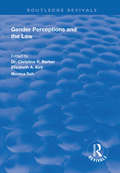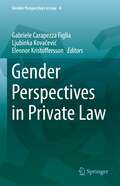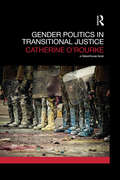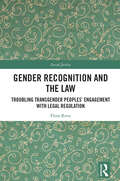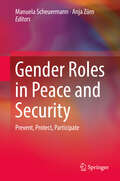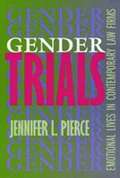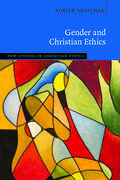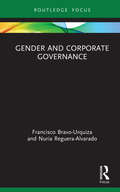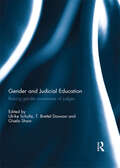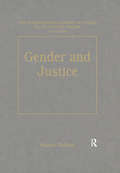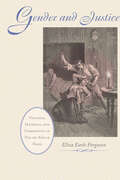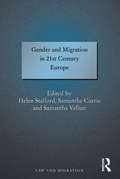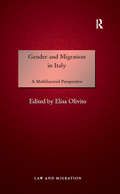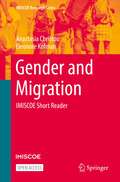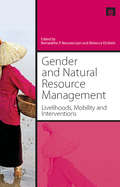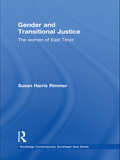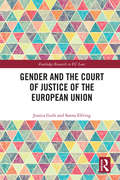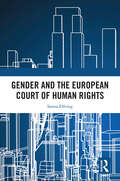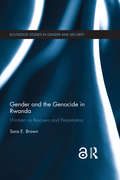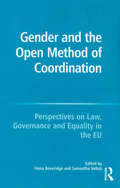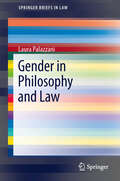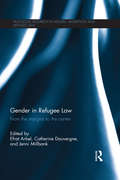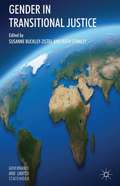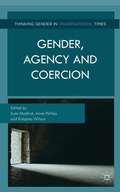- Table View
- List View
Gender Perceptions and the Law (Routledge Revivals)
by Christine R. Barker Elizabeth A. Kirk Monica SahPublished in 1998. This collection of papers, written by leading lawyers and sociologists in the UK, focuses on the relationships between gender and the law in the context of three areas of law: family law, criminal law and equal rights. The papers argue that gender roles within society affect the legal rights of individuals and impact on procedures they go through to enforce their rights or to gain redress for wrongs done to them. By failing to recognize the social and economic situations in which men and women are placed, the law perpetuates inequalities in their positions. Where attempts are made to ensure equality between the sexes, the result is often the exact opposite, because the legal system treats individuals as equals operating in a vacuum, ignoring the argument that equal treatment does not necessarily mean the same treatment, but can mean different treatment to ensure equality of result. Topics include: ¢ Disputes in the area of parental child custody rights ¢ The rights of surviving spouses to their deceased partner’s estate ¢ Theories for violent behaviour in women as contrasted with men ¢ Gender bias in criminal sentencing ¢ The role of European law in promoting sex equality in the work place ¢ Pornography and free speech ¢ Homosexuality as a civil right of citizenship
Gender Perspectives in Private Law (Gender Perspectives in Law #4)
by Eleonor Kristoffersson Gabriele Carapezza Figlia Ljubinka KovačevićThis book discusses prominent and controversial gender-related issues across the fields of family law, tort law, labour law, civil procedure law, ADR and private international law. An important critical assumption made by the authors is that the gender equality perspective has been largely neglected in several branches of private law, since scholars researching the intersection between gender and legal studies are mostly focused on public law and human rights law. In light of that, the book contributes not only to the deconstruction of gender-blind private law, but also to the development of a gender-competent analysis of the key branches of private law, starting with private international law. Gender perspective in family law is analyzed on the basis of gendered and heteronormative operations of family law with reference to the formation of legally recognized relationships, the establishment of legal parenthood, the division of marital property after a divorce, and the arrangements for post-separation parenting. Also, regulation of family matters in Indian society and the gender equality perspective from the principle of the child’s best interest are considered. As far as tort law is concerned, the book addresses compensation for damages suffered by women performing unpaid household work. Further, it contains papers dedicated to the following labour law issues: the genesis of labor law and its capacity to contribute either to worsening gender inequality in the world of work or to promoting gender equality; gender segregation in the labour market and its connection to family-friendly policies in the European Union; sexual harassment at work; and the impact of work digitalization on gender-related labour law issues. Lastly, the authors analyze gender equality in civil procedural law, as well as in mediation as a tool for encouraging the peaceful settlement of disputes. The book is intended to improve awareness of the wide range of private law issues that are important for understanding the ways in which gender inequality shapes everyday experiences, while also presenting critical considerations of the key private law instruments for achieving gender equality.
Gender Politics in Transitional Justice
by Catherine O'RourkeWhat role do transitional justice processes play in determining the gender outcomes of transitions from conflict and authoritarianism? What is the impact of transitional justice processes on the human rights of women in states emerging from political violence? Gender Politics in Transitional Justice argues that human rights outcomes for women are determined in the space between international law and local gender politics. The book draws on feminist political science to reveal the key gender dynamics that shape the strategies of local women’s movements in their engagement with transitional justice, and the ultimate success of those strategies, termed ‘the local fit’. Also drawing on feminist doctrinal scholarship in international law, ‘the international frame’ examines the role of international law in defining harms against women in transitional justice and in determining the ‘from’ and ‘to’ of transitions from conflict and authoritarianism. This book locates evolving state practice in gender and transitional justice over the past two decades within the context of the enhanced protection of women’s human rights under international law. Relying on original empirical and legal research in Chile, Northern Ireland and Colombia, the book speaks more broadly to the study of gender politics and international law in transitional justice.
Gender Recognition and the Law: Troubling Transgender Peoples' Engagement with Legal Regulation (Social Justice)
by Flora RenzAnalysing the strategies people use to resist, accept and respond to laws that attempt to shape not just their behaviour, but also their identity, this book pursues a critical engagement with legal gender transition. The Gender Recognition Act (GRA) has often been described as a groundbreaking and progressive legal framework for allowing people to legally change their gender. This book seeks to challenge this representation by drawing on in-depth qualitative interviews with trans people about the GRA. Theoretically this book uses the concepts of legal consciousness, agency and emotion to highlight the normative underpinnings of the GRA. Overall, the book contends, the GRA does not accurately reflect many trans people's own understanding of their gender identity or their sexuality. It is designed to create subjects that govern their behaviour and self-expression in a way that aligns with a purely binary model of sex/gender and sexuality. Although a deviation from these norms does not incur any direct punishment, it indirectly leads to a denial of rights and legal protections. By reviewing relevant legislation and case law, and through qualitative research, the book establishes how, instead of uncritically accepting or completely rejecting the GRA, trans people enact their singular identities by engaging strategically with law. This book will be of interest across a range of disciplines, including socio-legal studies, family law, gender, sexuality and law as well as sociology courses on gender, identity and social policy.
Gender Roles in Peace and Security: Prevent, Protect, Participate
by Manuela Scheuermann Anja ZürnThis volume examines the specific gender roles in peace and security. The authors analyse the implementation process of United Nations Security Council Resolution 1325 in various countries and discuss systemic challenges concerning the Women, Peace and Security agenda. Through in-depth case studies, the authors shed new light on topics such as the gender-related mechanisms of peace processes, gender training practices for police personnel, and the importance of violence prevention. The volume studies the role of women in peace and security as well as questions of gender mainstreaming by adopting various theoretical concepts, including feminist theories, concepts of masculinity, organizational and security studies. It also highlights regional and transnational approaches for the implementation of the Women, Peace and Security agenda, namely the perspectives of the European Union, NATO, the UN bureaucracy and the civil society. It presents best cases and political advice for tackling the problem of gender inequality in peace and security.
Gender Trials: Emotional Lives In Contemporary Law Firms
by Jennifer L. PierceThis engaging ethnography examines the gendered nature of today's large corporate law firms. Although increasing numbers of women have become lawyers in the past decade, Jennifer Pierce discovers that the double standards and sexist attitudes of legal bureaucracies are a continuing problem for women lawyers and paralegals. Working as a paralegal, Pierce did ethnographic research in two law offices, and her depiction of the legal world is quite unlike the glamorized version seen on television. Pierce tellingly portrays the dilemma that female attorneys face: a woman using tough, aggressive tactics--the ideal combative litigator--is often regarded as brash or even obnoxious by her male colleagues. Yet any lack of toughness would mark her as ineffective. Women paralegals also face a double bind in corporate law firms. While lawyers depend on paralegals for important work, they also expect these women--for most paralegals are women--to nurture them and affirm their superior status in the office hierarchy. Paralegals who mother their bosses experience increasing personal exploitation, while those who do not face criticism and professional sanction. Male paralegals, Pierce finds, do not encounter the same difficulties that female paralegals do. Pierce argues that this gendered division of labor benefits men politically, economically, and personally. However, she finds that women lawyers and paralegals develop creative strategies for resisting and disrupting the male-dominated status quo. Her lively narrative and well-argued analysis will be welcomed by anyone interested in today's gender politics and business culture.
Gender and Christian Ethics (New Studies in Christian Ethics)
by Adrian ThatcherIn this book, Adrian Thatcher offers fresh theological arguments for expanding our understanding of gender. He begins by describing the various meanings of gender and depicts the relations between women and men as a pervasive human and global problem. Thatcher then critiques naive and harmful theological accounts of sexuality and gender as binary opposites or mistaken identities. Demonstrating that the gendered theologies of Hans Urs von Balthasar and Karl Barth, as well as the Vatican's “war on gender” rest on questionable binary models, he replaces these models with a human continuum that allows for sexual difference without assuming “opposite sexes” and normative sexualities. Grounded in core Christian doctrines, this continuum enables a full theological affirmation of LGBTIQ people. Thatcher also addresses the excesses of the male/female binary in secular culture and outlines a hermeneutic that delivers justice and acceptance instead of sexism and discrimination.
Gender and Corporate Governance (Routledge Focus on Accounting and Auditing)
by Francisco Bravo-Urquiza Nuria Reguera-AlvaradoGender diversity as a corporate governance mechanism is high on the agenda for regulators, firms, and researchers. Particularly, gender board composition has received a great deal of attention in recent years. The theoretical foundations of the benefits associated with the inclusion of female directors on boards, how to measure gender diversity in the boardroom, and its real impact on board decisions and firm strategies remain hotly debated. Drawing on empirical data, this book summarises the current situation regarding gender board diversity and provides a concise overview of the most important concerns about this topic. This will be a vital tool to guide the future debate on gender diversity and corporate governance for researchers and advanced students, as well as regulators, policy makers and board members.
Gender and Judicial Education: Raising Gender Awareness of Judges
by Ulrike Schultz, T. Brettel Dawson and Gisela ShawJudicial Education has greatly expanded in common law countries in the past 25 years. More recently it has become a core component in judicial reform programs in developing countries with gender attentiveness as an element required by donor agencies. In civil law jurisdictions judges´ schools have long played a role in the formation of the career judiciary with a focus on entry to the judicial profession, in some countries judges get an intensive in-service education at judicial academies. Gender questions, however, tend to be neglected in the curricula.These judicial education activities have generated a significant body of material and experience which it is timely to review and disseminate. Questions such as the following require answers. What is the current state of affairs? How is judicial education implemented in developed and developing countries all around the world? Who are the educators? Who is being educated? How is judicial education on gender regarded by judges? How effective are these programs?The chapters in this book deal with these questions. They provide a multiplicity of perspectives. Six countries are represented, of these four are civil law countries (Germany, Argentina, Japan, Bosnia and Herzegovina) and two are common law countries (Canada; Uganda). This book was previously published as a special issue of International Journal of the Legal Profession.
Gender and Justice (The\international Library Of Essays In Law And Legal Theory (second Series) Ser. #2)
by Ngaire NaffineThe leading articles on gender and justice within Anglo-American legal theory are assembled in this volume. The essays are drawn primarily from the writings of lawyers working in the common law tradition and they mainly examine the justice of legal institutions. Due to the close kinship between political and legal theories of justice, the book also includes a selection of the work of the more prominent political theorists of justice and gender.
Gender and Justice: Violence, Intimacy, and Community in Fin-de-Siècle Paris (The Johns Hopkins University Studies in Historical and Political Science #128)
by Eliza Earle FergusonHistorian Eliza Earle Ferguson’s meticulously researched study of domestic violence among the working class in France uncovers the intimate details of daily life and the complex workings of court proceedings in fin-de-siècle Paris. With detective-like methods, Ferguson pores through hundreds of court records to understand why so many perpetrators of violent crime were fully acquitted. She finds that court verdicts depended on community standards for violence between couples. Her search uncovers voluminous testimony from witnesses, defendants, and victims documenting the conflicts and connections among men and women who struggled to balance love, desire, and economic need in their relationships.Ferguson's detailed analysis of these cases enables her to reconstruct the social, cultural, and legal conditions in which they took place. Her ethnographic approach offers unprecedented insight into the daily lives of nineteenth-century Parisians, revealing how they chose their partners, what they fought about, and what drove them to violence. In their battles over money and sex, couples were in effect testing, stretching, and enforcing gender roles.Gender and Justice will interest social and legal historians for its explanation of how the working class of fin-de-siècle Paris went about their lives and navigated the judicial system. Gender studies scholars will find Ferguson’s analysis of the construction of gender particularly trenchant.
Gender and Migration in 21st Century Europe (Law and Migration)
by Samantha CurrieProviding interdisciplinary and empirically grounded insights into the issues surrounding gender and migration into and within Europe, this work presents a comprehensive and critical overview of the historical, legal, policy and cultural framework underpinning different types of European migration. Analysing the impact of migration on women's careers, the impact of migration on family life and gender perspectives on forced migration, the authors also examine the consequences of EU enlargement for women's migration opportunities and practices, as well as the impact of new regulatory mechanisms at EU level in addressing issues of forced migration and cross-national family breakdown. Recent interdisciplinary research also offers a new insight into the issue of skilled migration and the gendering of previously male-dominated sectors of the labour market.
Gender and Migration in Italy: A Multilayered Perspective (Law and Migration)
by Elisa OlivitoRecent migratory flows to Europe have brought about considerable changes in many countries. Italy in particular offers a unique point of view, since it is possible to observe not only the way migration has changed specific features of the country, but also how it is intertwined with gender relations. Considering both the type of migration that has affected Italy and the consequent measures adopted by the Government, a variety of distinctive elements may be seen. By providing a broad and more complete picture of the Italian perspective on gender and migration, this book makes a valuable contribution to the wider debate. The contributions consider the problematic linkage between gender and migration, as well as analyse particular aspects including Italian colonial past, domestic work, self-determination, access to social services, second-generation migrant women, family law, multiculturalism and religious symbols. Taking an empirical and theoretical approach, the volume underlines both the multifaceted problems affecting migrant women in Italy and the way in which questions raised in other countries are introduced and redefined by Italian scholarship. The book presents a valuable resource for researchers, academics and policy-makers working in the areas of migration and gender studies.
Gender and Migration: IMISCOE Short Reader (IMISCOE Research Series)
by Eleonore Kofman Anastasia ChristouThis open access short reader offers a critical review of the debates on the transformation of migration and gendered mobilities primarily in Europe, though also engaging in wider theoretical insights. Building on empirical case studies and grounded in an analytical framework that incorporates both men and women, masculinities, sexualities and wider intersectional insights, this reader provides an accessible overview of conceptual developments and methodological shifts and their implications for a gendered understanding of migration in the past 30 years. It explores different and emerging approaches in major areas, such as: gendered labour markets across diverse sectors beyond domestic and care work to include skilled sectors of social reproduction; the significance of families in migration and transnational families; displacement, asylum and refugees and the incorporation of gender and sexuality in asylum determination; academic critiques and gendered discourses concerning integration often with the focus on Muslim women. The reader concludes with considerations of the potential impact of three notable developments on gendered migrations and mobilities: Black Lives Matter, Brexit and COVID-19. As such, it is a valuable resource for students, academics, policy makers, and practitioners.
Gender and Natural Resource Management: Livelihoods, Mobility and Interventions
by Rebecca Elmhirst Bernadette P. ResurreccionThis book is about the gender dimensions of natural resource exploitation and management, with a focus on Asia. It explores the uneasy negotiations between theory, policy and practice that are often evident within the realm of gender, environment and natural resource management, especially where gender is understood as a political, negotiated and contested element of social relationships. It offers a critical feminist perspective on gender relations and natural resource management in the context of contemporary policy concerns: decentralized governance, the elimination of poverty and themainstreaming of gender. Through a combination of strong conceptual argument and empirical material from a variety of political economic and ecological contexts (including Cambodia, China, Indonesia, Malaysia, Nepal, Thailand and Vietnam), the book examines gender-environment linkages within shifting configurations of resource access and control. The book will serve as a core resource for students of gender studies and natural resource management, and as supplementary reading for a wide range of disciplines including geography, environmental studies, sociology and development. It also provides a stimulating collection of ideas for professionals looking to incorporate gender issues within their practice in sustainable development. Published with IDRC.
Gender and Sexuality in Latin America - Cases and Decisions
by Cristina Motta Macarena SaezTranslated and updated from the seminal Spanish text on legal decisions affecting gender and sexuality in Latin America, this English edition is the only law text to focus specifically on the rights of lesbians, gays, bisexuals and the transgender population in addition to women's rights more broadly. The volume provides close analysis of some of the most important decisions made by Latin American national courts, as well as those made by international legal bodies, that affect the rights and interests of these groups. Specially selected for their depth of argument and value as exemplars, the studies of good legal practice chart the path of the region's normative values of justice as they have evolved away from a partial, and patriarchal, exercise of the law. They show how cases with vastly differing contexts such as, property rights and domestic violence have resulted in a mixed body of Latin American law. Some decisions are protective of women's and minority rights. Some assess the wider social impacts of case law in which recognition of the discrete legal identities within households challenges established precepts, including religious ones. Other cases have been chosen as cautionary examples of bad decision-making and for the poverty of their legal debate. Updated to include the latest relevant jurisprudence from across the continent, this book is an informed, cohesive and comprehensive guide to understanding women's and gender-based rights in Latin America.
Gender and Transitional Justice: The Women of East Timor (Routledge Contemporary Southeast Asia Series)
by Susan Harris RimmerGender and Transitional Justice provides the first comprehensive feminist analysis of the role of international law in formal transitional justice mechanisms. Using East Timor as a case study, it offers reflections on transitional justice administered by a UN transitional administration. Often presented as a UN success story, the author demonstrates that, in spite of women and children’s rights programmes of the UN and other donors, justice for women has deteriorated in post-conflict Timor, and violence has remained a constant in their lives. This book provides a gendered analysis of transitional justice as a discipline. It is also one of the first studies to offer a comprehensive case study of how women engaged in the whole range of transitional mechanisms in a post-conflict state, i.e. domestic trials, internationalised trials and truth commissions. The book reveals the political dynamics in a post-conflict setting around gender and questions of justice, and reframes of the meanings of success and failure of international interventions in the light of them.
Gender and the Court of Justice of the European Union (Routledge Research in EU Law)
by Jessica Guth Sanna ElfvingOffering an alternative exploration of the Court of Justice of the European Union (CJEU) and its work, this book aims to start a conversation between legal, political and gendered examinations of the Court of Justice and some of the substantive areas of law it is concerned with. In doing so, it provides a broader and more holistic view of the Court and its work which can add to our understanding of the institution, its role and its case law as well as the contribution it can and does make to shaping law and policy and EU and national level.
Gender and the European Court of Human Rights (Routledge Research in EU Law)
by Sanna ElfvingIn applying an intersectional feminist legal analysis of the European Court of Human Rights’ case law in a variety of human rights issues, this book reveals a different and nuanced understanding of the gender issues.Case law within the ECtHR, which does not explicitly raise gender issues, may have gendered consequences. Profound developments have occurred in Europe in several related areas, including gender equality case law in the context of the prohibition of discrimination under Article 14 of the European Convention on Human Rights; non-conventional parenting rights; discrimination on grounds of sexual orientation and gender identity; rights of asylum seekers; and family reunification rights in the past few decades. The analysis reveals the extent to which the Court considers an applicant’s gender, intersectional inequalities, and the concept of ‘vulnerability’ in its case law. This book contributes to existing literature on gender equality, gender and judging in supranational courts. Furthermore, it highlights the intersectional discrimination experienced by women and diasporic or minoritised groups by uncovering new dimensions of vulnerabilities.This book will be of interest to researchers in the field of European human rights law, gender, and intersectional issues.
Gender and the Genocide in Rwanda: Women as Rescuers and Perpetrators (Routledge Studies in Gender and Security)
by Sara E. BrownThis book examines the mobilization, role, and trajectory of women rescuers and perpetrators during the 1994 genocide in Rwanda. While much has been written about the victimization of women during the 1994 genocide in Rwanda, very little has been said about women who rescued targeted victims or perpetrated crimes against humanity. This book explores and analyzes the role played by women who exercised agency as rescuers and as perpetrators during the genocide in Rwanda. As women, they took actions and decisions within the context of a deeply entrenched patriarchal system that limited their choices. This work examines two diverging paths of women’s agency during this period: to rescue from genocide or to perpetrate genocide. It seeks to answer three questions: First, how were certain Rwandan women mobilized to participate in genocide, and by whom? Second, what were the specific actions of women during this period of violence and upheaval? Finally, what were the trajectories of women rescuers and perpetrators after the genocide? Comparing and contrasting how women rescuers and perpetrators were mobilized, the actions they undertook, and their post-genocide trajectories, and concluding with a broader discussion of the long-term impact of ignoring these women, this book develops a more nuanced and holistic view of women’s agency and the genocide in Rwanda. This book will be of much interest to students of gender studies, genocide studies, African politics and critical security studies. The Open Access version of this book, available at https://www.routledge.com/Gender-and-the-Genocide-in-Rwanda-Women-as-Rescuers-and-Perpetrators/Brown/p/book/9780367188092, has been made available under a Creative Commons Attribution-Non Commercial-No Derivatives 4.0 license.
Gender and the Open Method of Coordination: Perspectives on Law, Governance and Equality in the EU
by Samantha VellutiContaining contributions by some of the best known researchers in the field, this volume considers the intersection between the Open Method of Coordination (OMC), a relatively new mode of policy-making, and gender equality, a long-standing area of EU policy. It draws on a range of disciplinary perspectives to examine the effectiveness of the OMC as a medium for the advancement of gender equality within the EU. It also considers gender in the OMC in a variety of contexts and at both a general EU and Member State level. Central to the discussion is the concept of gender mainstreaming which proposes that a gender equality perspective should be incorporated at every level and opportunity of EU policy and practice. The authors assess how successful this has been in the context of the OMC. The book provides a unique and contemporary body of work on the OMC which adds significantly to existing understandings of this form of governance and informs critical debate of EU social governance.
Gender in Philosophy and Law
by Laura PalazzaniThis book is an introductory systematic framework in the complex and interdisciplinary sex/gender debate, focusing on philosophy of law.The volume analyses the different theories that have dealt with the gender category, highlighting the conceptual premises and the arguments of the most influential theories in the debate, which have had repercussions on the field of the ethical and juridical debate (with reference to intersexuality, transsexualism, transgender, homosexuality). The aim is to offer a sort of conceptual orientation in the complexity of the debate, in an effort to identify the various aspects and development processes of the theories, so as to highlight the conceptual elements of the theorisations to grasp the problem areas within them. It is therefore an overall synthetic and also explicative analysis, but not only explicative: the aim is to outline the arguments supporting the different theories and the counter-arguments too, for the purpose of proposing categories to weigh up the elements and to take one's own critical stance, with a methodological style that is neither descriptive nor prescriptive, but critical.
Gender in Refugee Law: From the Margins to the Centre (Routledge Research in Asylum, Migration and Refugee Law)
by Catherine Dauvergne Efrat Arbel Jenni MillbankQuestions of gender have strongly influenced the development of international refugee law over the last few decades. This volume assesses the progress toward appropriate recognition of gender-related persecution in refugee law. It documents the advances made following intense advocacy around the world in the 1990s, and evaluates the extent to which gender has been successfully integrated into refugee law. Evaluating the research and advocacy agendas for gender in refugee law ten years beyond the 2002 UNHCR Gender Guidelines, the book investigates the current status of gender in refugee law. It examines gender-related persecution claims of both women and men, including those based on sexual orientation and gender identity, and explores how the development of an anti-refugee agenda in many Western states exponentially increases vulnerability for refugees making gendered claims. The volume includes contributions from scholars and members of the advocacy community that allow the book to examine conceptual and doctrinal themes arising at the intersection of gender and refugee law, and specific case studies across major Western refugee-receiving nations. The book will be of great interest and value to researchers and students of asylum and immigration law, international politics, and gender studies.
Gender in Transitional Justice
by Susanne Buckley-Zistel Ruth StanleyBased on original empirical research, this book explores retributive and gender justice, the potentials and limits of agency, and the correlation of transitional justice and social change through case studies of current dynamics in post-violence countries such Rwanda, South Africa, Cambodia, East Timor, Columbia, Chile and Germany.
Gender, Agency, and Coercion
by Anne Phillips Sumi Madhok Kalpana WilsonDrawing on recent feminist discussions, this collection critically reassesses ideas about agency, exploring the relationship between agency and coercion in greater depth and across a range of disciplinary perspectives and ethical contexts.
